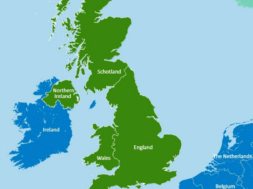
Roving Periscope: Is the United Kingdom heading for disintegration?
Virendra Pandit
New Delhi: What is the difference between the United Kingdom, the British Isles, Great Britain, and England?
The United Kingdom is a sovereign state including England, Scotland, Wales, and Northern Ireland. Great Britain is an island off the north coast of Europe. The British Isles is an archipelago of over 6,000 islands, of which Great Britain is the largest. And England is a ‘country’ within the UK!
Well, this complex nomenclature may become simple with the probable rise of at least three independent nations—England, Scotland, and Wales—and the likely merger of the Protestant Northern Ireland with the parent Republic of Ireland.
With the exit of Britain from the European Union—Brexit, 2016—separatists in Scotland and Wales have been demanding separation from England as well. Insipient separatist movements have always existed in the UK.
In fact, Scotland has its own laws and parliament in the capital Edinburgh. Likewise, Wales also has Senedd, officially called the Welsh Parliament in the English language, and Senedd Cymry in Welsh. It is the unicameral legislature of Wales that makes laws for Wales, levies certain taxes, and scrutinized the Welsh Government.
Separatist movements in Scotland, Wales, and Northern Ireland, seeking a divorce from England, have seen difficulties across the last century. Northern Ireland has witnessed violence and killings with the Irish Republican Army (IRA) going active on and off since the 1920s. The IRA also supports a political party, Sinn Fein (We, Ourselves),
Now, its election as the largest party in Northern Ireland’s Assembly has stirred a hornet’s nest in Europe. Billed as a historic moment, for the first time an Irish nationalist party, rather than a British unionist one, has topped the voting.
Last Saturday, Sinn Fein won 27 seats out of 90. The Democratic Unionist Party, which had been the largest for two decades, won 24 seats, and the Alliance Party, which defines itself as neither nationalist nor unionist, cornered 17.
Sinn Fein, a party aiming to unite Northern Ireland with the neighboring Republic of Ireland, is on the verge of sharing power in a state (Northern Ireland) established a century ago as a break-away Protestant-majority region within the United Kingdom, vis-à-vis the predominantly Catholic Republic of Ireland.
For the Irish nationalists, the poll results are a major milestone for a party long linked to the IRA, a paramilitary group aiming to take Northern Ireland out of the UK. It is said to be responsible for the death of over 3,500 people in 30 years of violence.
A 1998 Good Friday peace accord ended large-scale violence and Northern Ireland now has a government sharing power between British unionists and Irish nationalists, according to the media reports. The deal said the Irish reunification can occur through referendums in both Northern Ireland and the Republic.
The poll result gives Sinn Fein the right to hold the post of the first minister in Northern Ireland’s power-sharing government. Sinn Fein may nominate Northern Ireland leader Michelle O’Neill for this post.
Irish unity and reunification remain Sein Fein’s supreme goals, its party leader Mary Lou McDonald said, favoring a referendum in Northern Ireland within a “five-year framework.”
But the road to the Irish unification may not be easy. Northern Ireland’s identity is in flux, with a growing number of people — especially the young — identifying as neither unionist nor nationalist. Their views were reflected in the strong showing of the centrist Alliance Party.













